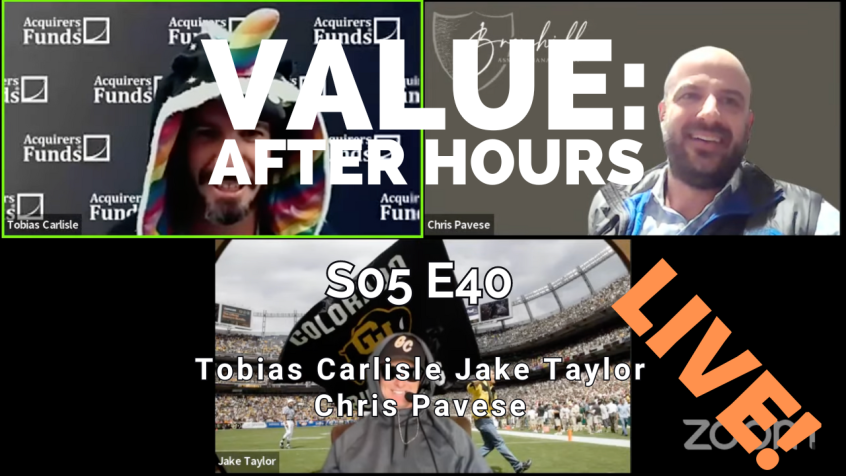During their latest episode of the VALUE: After Hours Podcast, Taylor, Carlisle, and Pavese discussed Self-Serving Bias and Ant Mills: Are We Trapped in Mental Death Spirals?. Here’s an excerpt from the episode:
Tobias: JT, do you want to do your veggies before we–?
Jake: Yes, sir.
Tobias: Chris, we have to do the vegetables-
Jake: Obligatory.
Tobias: glorious nation for us to-.
Chris: All right. Let’s hear it.
Tobias: -learn something.
Jake: So today’s episode is entitled The Self Serving Bias and Ant Mills, and we will tie these together. So the self-serving bias is this tendency that we all have where we tend to evaluate things in ways that protect our own self-image. Like, when we succeed, we attribute it to our own abilities or efforts. “I knew what I was doing. I’m smart. I worked hard.” But when we fail, we tend to blame it on external factors, like, my boss had it out for me, or, “That test was unfair, or I was just hungry and tired, I’m not–” [crosstalk]
Tobias: [crosstalk]
Jake: Yeah. I’m not an asshole. Yeah, the Fed ate my homework. So, I was reading Shane Parrish’s new book. It’s called Clear Thinking. He had a section in there that I liked. He says, “If you got some result you didn’t want, the world is telling you one of two things. Either one, you were unlucky. If that’s the case, then you should probably keep doing what you’re doing and it’s likely to start working. Or, two, your ideas about how things work are wrong.” Most people don’t want to hear that they’re wrong. It’s a blow to our self-image. It hurts our egos. Instead, we tend to ignore what the world is telling us, and we keep doing what we’ve always done, and getting these same old bad results.
And so tying that together, I was on a long car ride with my 12 year old this weekend to a baseball tournament. He was telling me about this thing called ant death spiral, and I was like, “Okay. Well, hold on a second. You saw this on YouTube probably. So, it’s probably bullshit.” So I was a little skeptical, but I did a little bit of my own digging when I got home. It turns out that it’s a real thing. But scientists call it ant mill. It’s an observed phenomena where in a group of army ants, they get separated from the main foraging party, and they lose the pheromone track, and they begin to just follow one another round, and form these continuously rotating circles, and the circles are called death spirals. It’s because the ants eventually will just march themselves to exhaustion.
The largest ant mill ever discovered was 1,200ft in diameter, which in each ant, it took about two and a half hours to complete the circuit for each ant. And so when we think about ants, their brains are– they’re almost exactly one one millionth the times the size of our brains, some of you more or some of you less. The human brain is 1.1 liters to 1.2 liters, typically, and the ant is one microliter. So ants have this very simple input output functionality that’s wired into this limited number of neurons. And of course, we are much more complex. But it feels like we actually exhibit some of the same kind of ant mill behavior where we keep making the same mistakes over and over again and not learning and adjusting.
We get in our own little mental death spirals where we’re just circling around and following each other. The ants, they stop asking themselves like, “Are we doing something wrong here?” and trying to check. They’re maintaining this status quo of just following the ant in front of them. Shane has this pretty good quote in here that, “If you want to see whether your thinking is wrong, you need to make it visible. Making what was previously invisible visible gives us the best chance of seeing what we knew and what we thought at the time the decision was made. Relying on memory won’t work because the ego distorts information to make us look better than we actually are.”
So I think we’re all a little bit guilty occasionally of running into our own little ant mill where we just circling around and we’re not stopping to check our assumptions and check, are we doing the right things? A lot of times, it’s because our ego is holding us back.
Tobias: Good one.
You can find out more about the VALUE: After Hours Podcast here – VALUE: After Hours Podcast. You can also listen to the podcast on your favorite podcast platforms here:
For all the latest news and podcasts, join our free newsletter here.
Don’t forget to check out our FREE Large Cap 1000 – Stock Screener, here at The Acquirer’s Multiple:



